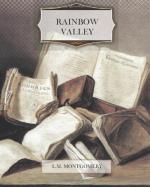“I’m so glad I have one daughter who can wear pink,” Mrs. Blythe was wont to say jubilantly.
Diana Blythe, known as Di, was very like her mother, with gray-green eyes that always shone with a peculiar lustre and brilliancy in the dusk, and red hair. Perhaps this was why she was her father’s favourite. She and Walter were especial chums; Di was the only one to whom he would ever read the verses he wrote himself—the only one who knew that he was secretly hard at work on an epic, strikingly resembling “Marmion” in some things, if not in others. She kept all his secrets, even from Nan, and told him all hers.
“Won’t you soon have those fish ready, Jem?” said Nan, sniffing with her dainty nose. “The smell makes me awfully hungry.”
“They’re nearly ready,” said Jem, giving one a dexterous turn. “Get out the bread and the plates, girls. Walter, wake up.”
“How the air shines to-night,” said Walter dreamily. Not that he despised fried trout either, by any means; but with Walter food for the soul always took first place. “The flower angel has been walking over the world to-day, calling to the flowers. I can see his blue wings on that hill by the woods.”
“Any angels’ wings I ever saw were white,” said Nan.
“The flower angel’s aren’t. They are a pale misty blue, just like the haze in the valley. Oh, how I wish I could fly. It must be glorious.”
“One does fly in dreams sometimes,” said Di.
“I never dream that I’m flying exactly,” said Walter. “But I often dream that I just rise up from the ground and float over the fences and the trees. It’s delightful—and I always think, ’This isn’t a dream like it’s always been before. This is real’—and then I wake up after all, and it’s heart-breaking.”
“Hurry up, Nan,” ordered Jem.
Nan had produced the banquet-board—a board literally as well as figuratively—from which many a feast, seasoned as no viands were elsewhere, had been eaten in Rainbow Valley. It was converted into a table by propping it on two large, mossy stones. Newspapers served as tablecloth, and broken plates and handleless cups from Susan’s discard furnished the dishes. From a tin box secreted at the root of a spruce tree Nan brought forth bread and salt. The brook gave Adam’s ale of unsurpassed crystal. For the rest, there was a certain sauce, compounded of fresh air and appetite of youth, which gave to everything a divine flavour. To sit in Rainbow Valley, steeped in a twilight half gold, half amethyst, rife with the odours of balsam-fir and woodsy growing things in their springtime prime, with the pale stars of wild strawberry blossoms all around you, and with the sough of the wind and tinkle of bells in the shaking tree tops, and eat fried trout and dry bread, was something which the mighty of earth might have envied them.
“Sit in,” invited Nan, as Jem placed his sizzling tin platter of trout on the table. “It’s your turn to say grace, Jem.”




